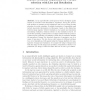Free Online Productivity Tools
i2Speak
i2Symbol
i2OCR
iTex2Img
iWeb2Print
iWeb2Shot
i2Type
iPdf2Split
iPdf2Merge
i2Bopomofo
i2Arabic
i2Style
i2Image
i2PDF
iLatex2Rtf
Sci2ools
MABS
2007
Springer
2007
Springer
Beyond Accuracy. Reputation for Partner Selection with Lies and Retaliation
In an unpredictable, heterogeneous world, intelligent agents depend on accurate social information; reputation, among the preeminent artifacts to transmit social evaluations, has been receiving growing attention by social scientists. A realistic description of reputation must include inaccurate information; in this paper, based on the distinction between image (agents’ believed evaluation of a target) and reputation (circulating evaluation, without reference to the evaluation source), we model the spreading of information in a simple market with the presence of liars and the possibility of retaliation. While fear of retaliation inhibits the spreading of image, the detached character of reputation can be a cause of inaccuracy; The two forces could balance in different settings. In a set of simulations, with agents using the Repage platform for management of image and reputation, we compare the usage of image alone with the usage of both image and reputation. Reputation is shown to be...
| Added | 08 Jun 2010 |
| Updated | 08 Jun 2010 |
| Type | Conference |
| Year | 2007 |
| Where | MABS |
| Authors | Isaac Pinyol, Mario Paolucci, Jordi Sabater-Mir, Rosaria Conte |
Comments (0)

